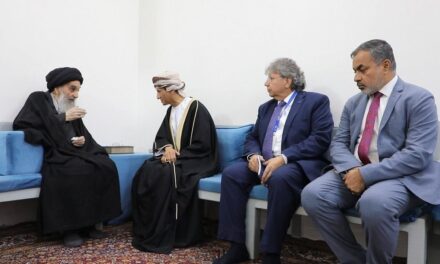The fate of the Global Coalition to Defeat ISIS in Iraq was first questioned in March 2018, just three months after former Prime Minister Haider Al-Abadi announced that ISIS was territorially defeated. At the time, the Iraqi parliament voted to request a timeline from the prime minister outlining a scheduled withdrawal of the foreign troops making up the Coalition. Elections were scheduled for May 2018 and the issue of foreign troops, particularly Americans, was largely politicized and used for electoral campaigning. Abadi shrugged the issue off, claiming Iraqi forces still required the training and assistance of allies to counter lingering threats from ISIS.
The issue of foreign troops in Iraq grew more complicated as they became a target of paramilitary drone and rocket attacks. Although they had once fought the same enemy, certain armed groups turned their attention to the United States’ presence in Iraq. These attacks were largely performative and rarely resulted in casualties, but they did violate Iraqi sovereignty by defying and embarrassing the Iraqi government by attacking a foreign entity that was present at the invitation of the government. They also provoked responses from the United States which also infringed on Iraqi sovereignty. The back-and-forth in attacks reached a climax when the United States killed IRGC commander Qassim Soleimani and deputy head of the Iraqi Popular Mobilization Forces, Abu Mahdi Al-Muhandis on Baghdad Airport Road on January 3, 2020.
Fears of this attack escalating into a larger conflict forced another vote in the Iraqi parliament, this time not asking the prime minister for a timeline for withdrawal, but outright demanding the removal of foreign troops. However, the vote, like the previous one, was non-binding, and while the prime minister at the time, Adil Abd Al-Mahdi supported this decision, he was politically weak, as he had already resigned a month before due to nationwide protests and was leading on an interim basis.
There are fewer foreign troops in Iraq today than there was in 2020, but their future in Iraq is once again in question, after the war in Gaza broke out last October. Attacks on diplomatic missions and military bases housing foreign troops had stopped when Prime Minister Mohammed Al-Sudani was elected in October 2022. Once Israel began its military campaign in Gaza, paramilitaries in Iraq restarted their attacks on Coalition forces. At the start of this year, the United States responded with an attack in Baghdad, near the Ministry of Interior, killing the commander of a paramilitary group. While Iraq’s political leadership has denounced attacks targeting the Coalition, they also released statements condemning the attack by the United States, claiming it violates the agreement they have with members of the Coalition.
The conflict between the paramilitaries and the United States is putting the Iraqi government in a difficult position. The government has demonstrated that it is incapable of holding certain paramilitaries in line and have to face the embarrassment of the United States responding by attacking targets on Iraqi territory. These attacks, in turn, provoke memories of the invasion and occupation in 2003, still fresh in the minds of many Iraqis. As a result, Prime Minister Sudani, who has had a cordial relationship with the United States to the surprise of many observers, is now finding himself cornered and has to respond.
When Spanish Prime Minister Pedro Sánchez visited Baghdad on December 27, Prime Minister Sudani stated that Iraq is looking to end the presence of the Coalition, since the capabilities of the Iraqi Security Forces have improved immensely, leaving no reason for the Coalition to remain. The Iraqi government followed this up the next week by sending a poll to Iraqis through SMS with a link to an online survey where Iraqis can voice their opinion on the presence of the Coalition. It is unclear whether this move is serious and the beginning phase of removing foreign troops from Iraq, or if it is merely a tactic designed to appease those calling for the Coalition’s removal. According to American media, American officials have not been informed of any move by the Iraqi government to request their removal.
Back in 2018 and 2020, when the Iraqi parliament voted on issues pertaining to the presence of foreign troops, Iraq still needed the Global Coalition to continue to fight the remnants of ISIS. There certainly was anger with the United States over the January 3, 2020 attack, but there was also a recognition that the Coalition in Iraq could not exist without the presence and leadership of the United States. Four years later, this is still the case. However, the capabilities of the Iraqi Security Forces have improved significantly, and security across all of Iraq bears witness to that. However, there are cautionary tales from the recent past of rushing the withdrawal of American forces from Iraq. They left in 2011, only to return in 2014 at the request of the Iraqi government to help them defeat ISIS.
Whether the Coalition formally leaves Iraq or not, the United States physically has the largest embassy in Baghdad and is currently building the largest consulate in Erbil, indicating its intent to remain an actor in Iraq. As a result, troop withdrawal does not preclude the United States from providing security assistance through its embassy, just as it does in other countries. The United States also continues to lead in spending on development assistance and plays a crucial role in balancing relations with Iran. Therefore, it is important for all sides to understand that the presence of troops does not dictate the relationship between Iraq and the United States, which is why the two governments need to reach a timeline and conclusion based on mutual benefit.
For many Americans, this may be a welcome development, as they continue to view the presence of their military in Iraq as a continuation of their “forever wars”. And, of course, many Iraqis are sensitive towards foreign troops because of the 2003 invasion and occupation.

Hamzeh Hadad
Hamzeh Hadad is a visiting fellow at the European Council on Foreign Relations and an adjunct fellow at the Center for a New American Security. In 2021, Hadad was an adviser to the president of the Trade Bank of Iraq. You can follow him on Bluesky: @hamzehhadad.bsky.social










